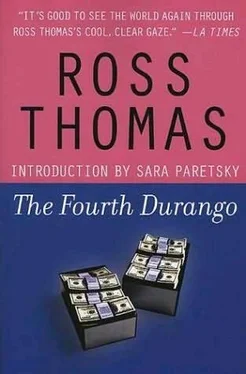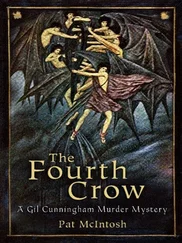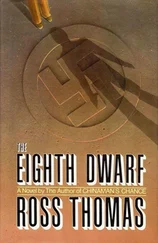“And?”
“And he said they clapped just twice.”
“Then what?”
“Then the stranger-priest hurries out of the Eagle and jumps in a van that drives off in a hurry.”
“What’d Father Frank do then?”
“He says since he didn’t have anybody to drink coffee with, he went home and went to bed.”
“What’d this other priest look like?”
Bryant nodded at Joe Huff, who pulled out a small notebook, turned some pages and read what he had written. “Short. Very short legs. About five-one. Forty to forty-five. Also fat. Round like a ball. Gray hair, cut short. And ugly. Porcine.”
“Porcine?”
“Piggy-looking. He had one of the noses that turn up and aim their nostrils right at you.”
“What color were his eyes?”
“Father Frank says he wasn’t close enough to tell,” Bryant said. “But he was close enough to see that the guy looked piggy.”
“What about the van?”
Bryant shook his head with regret. “No license number or make because Father Frank says he can’t tell a Buick from a Ford. But he did say it was pink.”
“Pink?”
Bryant nodded.
“Well,” Fork said. “That’s something.”
The roadhouse where Adair, Vines and B. D. Huckins were to meet the mayor’s richIranian brother-in-law at 1 P.M. that Saturday was four miles east of Durango on the south side of Noble’s Trace which, once past the city limits, changed from a boulevard into the two-lane blacktop that curved and twisted its way to U.S. 101.
The roadhouse was called Cousin Mary’s and owned by Merriman Dorr, who insisted it was a supper club and not a roadhouse at all. Dorr was a fairly recent immigrant from Florida who claimed to have taught geography at the University of Arkansas, flown as copilot for something called Trans-Caribbean Air Freight and, before all that, played two seasons at second base for the Savannah Indians in the double-A Southern League.
Not long after Dorr materialized in Durango, the ever dubious Sid Fork made a series of long-distance calls and discovered Dorr had done everything he claimed and more. The more included being held without bail for three months in the West Palm Beach jail on a vaguely worded fraud charge.
The alleged fraud had involved two and possibly three shipments of M-16 rifles and M-60 mortars. Dorr was said to have been paid for them by a Miami export-import firm called Midway There, Inc. The firm claimed it had never received shipment.
All charges against Dorr were suddenly dropped when Midway There, Inc., went out of business one Thanksgiving weekend, never to be heard from again.
After that, Sid Fork made no more investigatory long-distance calls about Merriman Dorr because, as he told the mayor, “It was all beginning to sound pretty much like spook stuff.” But Fork still considered it his civic duty to preserve Cousin Mary’s excellent menu and reasonable prices even though the roadhouse lay just outside his jurisdiction. So he paid Dorr a cautionary semiofficial visit eight weeks after the roadhouse opened for business.
“Why here?” he asked Dorr.
“When I was down in that West Palm Beach jail, I heard talk about your easy ways.”
“You hear about our rules?”
“No.”
“Well, the rules are no dope and no whores unless you want the Feds or the deputy sheriffs dropping by.”
“What about a nice quiet table-stakes poker game on weekends?”
“That’s different,” Sid Fork said.
B. D. Huckins drove her three-year-old gray Volvo sedan into the roadhouse parking lot and followed the gravel drive that led to the rear. Kelly Vines, noticing the small blue Neon sign that spelled out “Cousin Mary’s,” asked if there was indeed a Mary who was somebody’s cousin.
“Merriman Dorr,” said Huckins. “He owns the place.”
“Food any good?” Jack Adair asked from the backseat.
“The portions are too big.”
The final question came from Vines, who asked why there were no customers’ cars in the front parking lot.
“Because he doesn’t open till six,” the mayor said.
Cousin Mary’s had been an abandoned eighty-one-year-old two-room schoolhouse until Merriman Dorr bought and remodeled it, doing much of the work himself, even the wiring. He also added two wings and painted the place barn-red except for the roof. Every morning-although often it was barely before noon-Dorr ran the Stars and Stripes up the old but newly painted and still sturdy flagpole. When he first opened the place, Dorr had rung the old school bell at sunrise on all holidays. And even though his nearest neighbors lived a quarter of a mile away, all of them (except for one deaf woman) had called, written or come by to protest the dawn clangor. After that, Dorr rang the bell only on the Fourth of July and Veterans Day.
He also kept a wide yellow ribbon, almost a sash, tied around the trunk of the huge old oak that still grew in the middle of what had been the school playground but was now the roadhouse parking lot. The yellow ribbon, Dorr had told a twenty-three-year-old reporter from The Durango Times, memorialized all Americans still held hostage by assorted terrorists and “every other American who languishes in some foreign prison just because those airheads in Washington forgot to juice the right people.”
Some considered Dorr a patriot. Others thought he was a nut. He did a nice business.
Huckins parked her Volvo behind the roadhouse at the end of a row of five almost new and remarkably plain sedans of various American manufacture. Kelly Vines thought all the sedans might as well have worn vanity license plates that read: RENTED. B. D. Huckins caught his inspection of the overly anonymous cars and answered his unasked question. “They’re what the players drive.”
“Poker?”
“Poker.”
The back door of the roadhouse was familiar to Vines because he had had one just like it installed in the apartment of a client who had had good reason to believe that someone was trying to kill him. The door was at least two inches thick and consisted of a solid aluminum core wrapped with steel sheathing.
Huckins raised her fist to knock but before she could the door was opened by a lean six-footer with lively green eyes and a face rescued from male-model insipidness by a thin eggshell-white scar that ran from his left eye back to his left earlobe. The scar gave him a pleasantly sinister look that Vines thought was probably good for business.
Merriman Dorr’s green eyes flickered over Vines, tarried on Adair and came to rest on B. D. Huckins. He smiled then, letting perfect teeth gleam, and said, “I swear, B. D., you get prettier each and every time I see you and that surely’s not often enough.”
It was nicely put and softly said, but Huckins ignored the compliment and instead made minimal introductions. “Jack and Kelly. Merriman.”
“Gentlemen,” said Dorr, turning sideways so his guests could enter. As Huckins went by him she said, “I don’t see Parvis’s car.”
“Must be because he’s not here yet.”
Dorr and the mayor went down a hall, followed by Vines and Adair. They passed a closed door. In front of it in an armless wooden chair sat a watchful man in his fifties who rested a pump shotgun across his knees. From behind the door came the unmistakable click of poker chips being stacked or tossed into the pot.
Halfway down the hall they stopped at another closed door, which their host opened, almost bowing them into the room. “What an extraordinary cane,” Dorr said as Adair went by.
“An heirloom,” said Adair.
Dorr entered the room as B. D. Huckins was turning to inspect the large round table with its starched linen cloth, artfully folded napkins and four place settings of heavy silver, gold-rimmed china and crystal goblets, into which the napkins had been tucked. Vines noticed the room had no windows and guessed the almost silent air-conditioning kept the temperature at a permanent seventy-two degrees.
Читать дальше












